To halt 'fast-track' Byhalia pipeline permit, Memphis groups file lawsuit in federal court
This story is part of a larger project led by Sarah Macaraeg, a 2019 Data Fellow who is investigating the disproportionate number of asthma diagnoses and severe symptoms among Memphis children.
Other stories include:
Near Byhalia pipeline planned connection point, Valero leaked 800 gallons of crude oil in 2020
Byhalia pipeline: Toxic refinery pollution, monitoring blind spot in southwest Memphis
Toxic air. Insufficient monitors. Why Memphis families fighting Byhalia pipeline have had enough
More than 100,000 people in Shelby County are facing a pandemic without health insurance
5 things to know: How polluted streams interact with the Memphis Sand aquifer
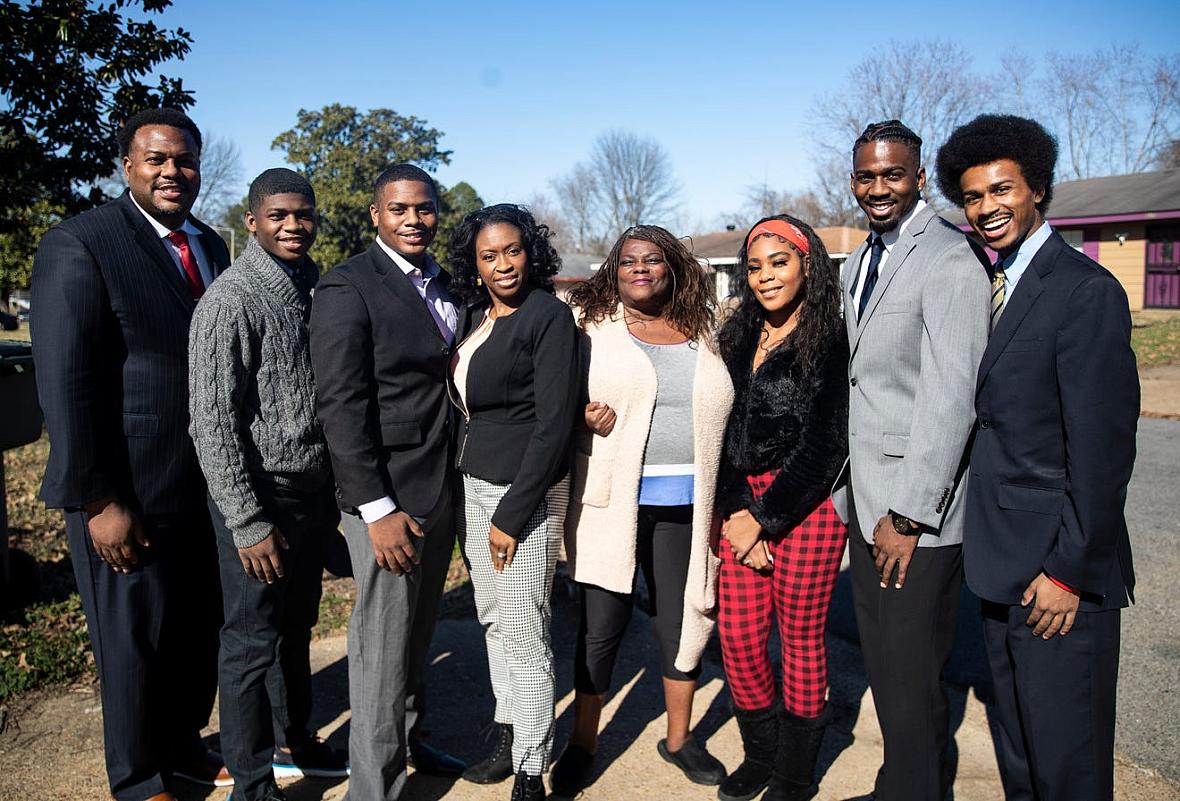
The Pearson family pose for a portrait near the family home in Memphis, Tenn., on Saturday, March 6, 2021.
Ariel Cobbert/ The Commercial Appeal
MCAP Founder says the Byhalia Pipline connection would bring many risks to Memphians
Ray Padilla, Memphis Commercial Appeal
With national attention on the proposed Byhalia pipeline mounting, a trio of Memphis environmental advocacy groups and the Southern Environmental Law Center filed a lawsuit Thursday against the U.S. Army Corps of Engineers, which issued a federal permit in February allowing for the 49-mile crude oil pipeline construction.
Because the type of “general" permit issued the Byhalia pipeline does not require the same environmental analysis as those the Corps greenlights on an individual, case-by-case basis, the suit alleges the Corps did not fulfill its requirements under the Clean Water Act and the National Environmental Policy Act to assess potential impacts to the Memphis drinking water supply and the 130 streams and wetlands crossed by the proposed route through southwest Memphis and northern Mississippi.
The Corps also falls "woefully short" of meeting public input requirements in its use of the permit for crude oil pipeline projects, according to the consortium of Memphis non-profits represented by the Southern Environmental Law Center, including the Sierra Club, Protect Our Aquifer and the newly incorporated Memphis Community Against Pollution, whose members launched the grassroots group Memphis Community Against the Pipeline in October.
Kenneth Williams, of the Corps' Public Affairs Office in Memphis, said in an email that while the agency cannot comment on ongoing litigation, the Memphis District has been transparent about its approval of the permit in responding to dozens of inquiries from citizens, media and public officials thus far.
Responding in early February to questions from U.S. Rep. Steve Cohen, the Corps acknowledged public interest concerns related to the risk of contamination in a protected area where Memphis Light, Gas and Water wellheads are connected below ground to the city's drinking water supply — and through which the pipeline is routed.
"The nationwide permit program was designed to enable quick determinations of activities with minimal environmental impacts," District Commander and Col. Zachary Miller wrote Cohen, citing the Corps' interpretation of a "public water supply intake" as limited to surface water.
Gov. Bill Lee, left, Memphis Mayor Jim Strickland, center, and Col. Zachary L. Miller with the Memphis District of the U.S. Army Corps of Engineers enter the former Commercial Appeal building at 495 Union to tour the new COVID-19 overflow hospital on Monday, May 18,202. Max Gersh/The Commercial Appeal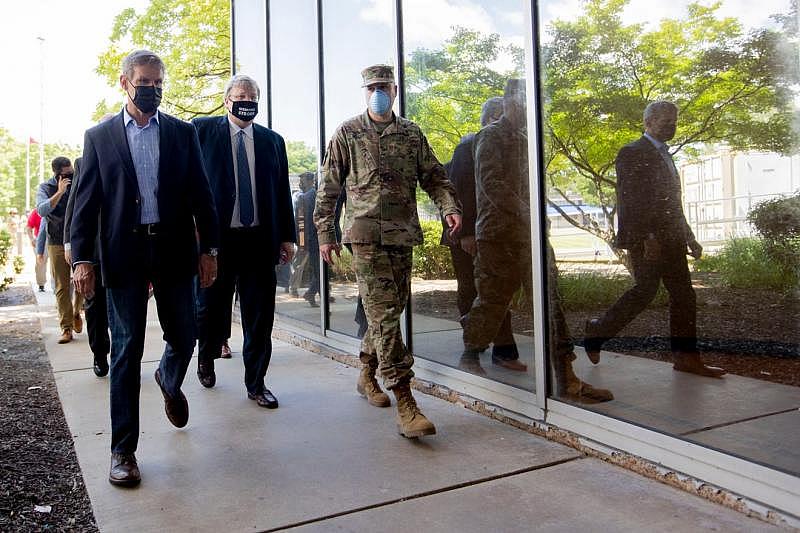
In an analysis of Pipeline and Hazardous Material Safety Administration data included in the complaint, the organizations opposed to the project state that of more than 4,000 oil and fuel spills recorded since 2010, "only about 7% of those were caught by leak detection systems."
For Justin J. Pearson, a leading member of Memphis Community Against Pollution, the federal permit approval provided Byhalia is unjust. His family owns property within a mile of the pipeline route and multiple members of his extended family who've lived there, he believes, have suffered the consequences of pollution-related health impacts, including premature death from cancer.
"This permit silences the communities most impacted by oil and gas pipelines and fails to protect our drinking water and the streams flowing through our neighborhoods. Southwest Memphis communities deserve better than this," Pearson said, in a press release sent by the Southern Environmental Law Center.
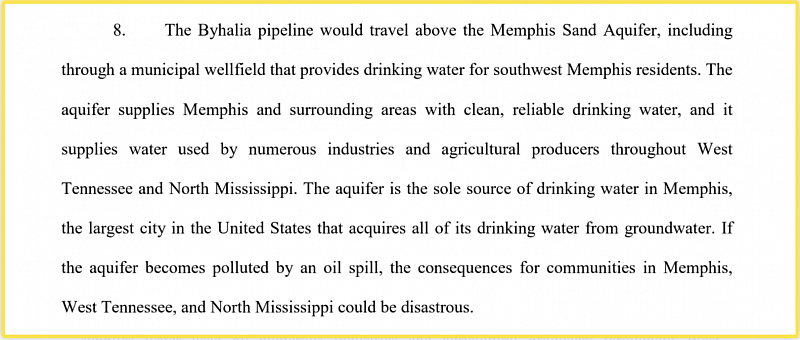
"The federal government should be working to protect people in the way of environmental harm, not fast-tracking pipelines that cut directly through communities," said Pearson.
In addition to concerns regarding the risk of contamination of the Memphis drinking water source below ground, the suit cites risks posed to local waterways and the disproportionate siting of industrial facilities in the nearly all-Black communities of southwest Memphis.
Drinking water
The Byhalia pipeline route runs atop the Memphis Sand Aquifer, including through a Memphis Light, Gas and Water municipal wellfield protection zone, according to the complaint. The suit notes members of each of the groups are MLGW customers.
The agency draws the city's drinking water from the aquifer, hundreds of feet below ground. A layer of clay largely serves as a barrier between it and surface contamination sources. But, 16 breaches in the clay were identified before the pipeline was proposed.
According to the plaintiffs, the pipeline route traverses "several known and suspected breaches" in Tennessee and in what's known as a recharge zone where the aquifer is replenished by rainfall, are "several miles... in North Mississippi which has no protective clay layer."
An MLGW spokesperson said the agency could not provide an immediate response — given the office's closure for holiday observances — to questions posed in a letter sent to the agency by the Southern Environmental Law Center in January.
In the letter, the legal group requested MLGW's plans to "preserve the integrity of its Wellhead Protection Zone" through which the pipeline is routed and asked for information on any requests MLGW has made of Byhalia or the U.S. Army Corps of Engineers.
Kizzy Jones, a co-founder of Memphis Community Against the Pipeline (MCAP), hold signs outside the National Civil Rights Museum with her family during a rally against the construction of the Byhalia Connection Pipeline, Tuesday, Feb.23, 2021, in Memphis, Tenn. Brandon Dahlberg/ For CommercialAppeal.com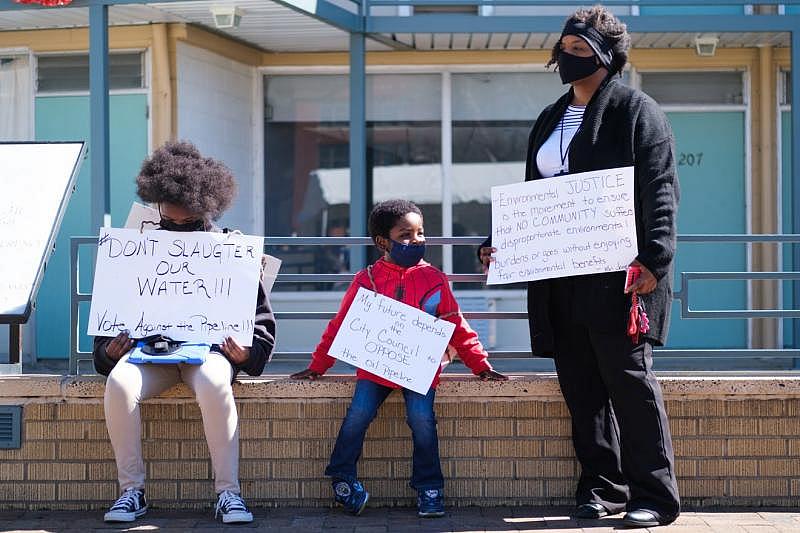
The Tennessee Department of Environment and Conservation's wellhead protection program requires "facilities in wellhead protection areas that store or handle hazardous substances... strictly comply with all regulatory requirements." Pipelines are identified among sources of ground water contamination on the program page.
A request sent Thursday afternoon for general information on file regarding wellhead protection requirements could not be fulfilled before the office closed for the holiday, a TDEC spokesperson said.
Public input
Amanda Garcia, director of the Southern Environmental Law Center's Tennessee office, said communities "have every right to be fully informed and voice their concerns about the ramifications for their quality of life.
"The lack of public input under this permit is not appropriate for large oil pipelines like Byhalia, which tend to have significant impacts on communities and the environment," she said.
The Corps issues a range of general permits in which Nationwide Permit 12 presides over utility line activities.
In order to bypass project-specific environmental impact analysis and the public comment process involved in issuing individual permits, the use of general permits "must be limited to only routine activities with minimal individual and cumulative environmental impacts," the suit states.
April 4, 2016 - Larry Stanley, owner of Riverside Lake Marina, picks up tools from his dock after a warning sign was installed on one of his work boats at McKellar Lake Monday. The City of Memphis has closed the boat ramp at 1875 McKellar Drive, which allows access to McKellar Lake, after a major sewer line transporting wastewater to the TE Maxson Wastewater Treatment Plant that was damaged. (Yalonda M. James/The Commercial Appeal)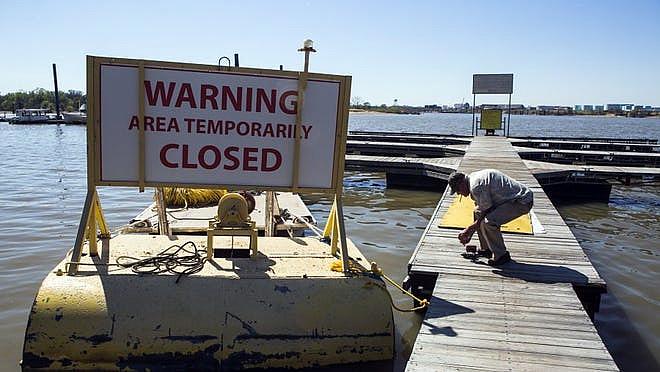
Crude oil pipelines in general and the planned Byhalia pipeline in particular don't fit that bill, according to the plaintiffs.
Because the current use and standards of Permit 12 were finalized in 2017, West Tennessee and Northern Mississippi residents only had opportunity for public input on the federal permit in 2016, when they "had no idea that years later a company would try to put a high-pressure crude oil pipeline next to their homes, through streams in their neighborhoods, and over their drinking water source", the federal complaint states.
A steel mill, two natural gas plants, a closed coal station where unlined coal ash pits remain and the Valero Memphis refinery are among facilities encircling southwest Memphis.The environmental advocacy groups are not the first to challenge the use of Permit 12 in approving a crude oil pipeline in federal court. In a case now in appeal, a Montana court found its use to be insufficient in meeting regulatory requirements.
Surface water
Ilsa Dewald, 19, and Chelsea Krist, 21, both from the University of Iowa, are among about 50 students cleaning up McKellar Lake through Living Lands & Waters' Alternative Spring Break. Last year the group collected 160,000 pounds of garbage from McKellar Lake in 12 days.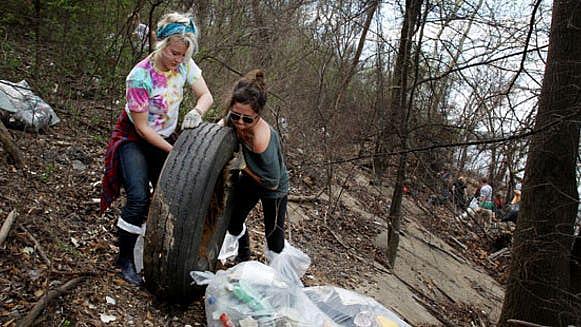
The suit notes Pearson, a member of Memphis Community Against Pollution's leadership team, "has several family members who lived for decades in southwest Memphis and died of cancer while still relatively young."
Pearson's past experience with a 2016 sewage spill and construction that could impact access to the nearby T.O. Fuller state park, as a greenspace southwest Memphis community rely on, are also cited in the suit.
Sierra Club leader Scott Banbury echoed the range of concerns in the complaint. After years of efforts by the Sierra Club and others to clean-up McKellar Lake, Banbury is concerned the water body would face a new contamination risk, given the potential for an oil leak.
Citing Pipeline and Hazardous Materials Safety Administration data, the suit states, "Thousands of barrels of oil are spilled each year resulting in millions of dollars of damages and sometimes injuries or even fatalities."
Sarah Macaraeg is an award-winning journalist who writes in-depth stories on accountability, solutions and communities for The Commercial Appeal. She can be reached at sarah.macaraeg@commercialappeal.com or on Twitter @seramak
[This story was originally published by Commercial Appeal.]

